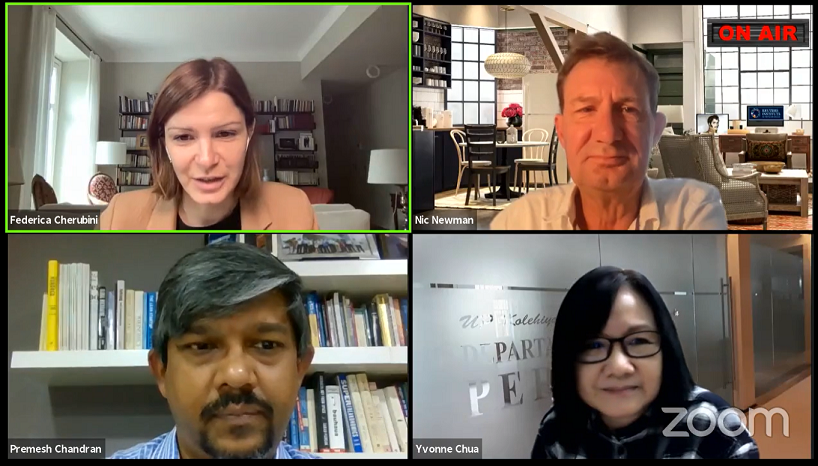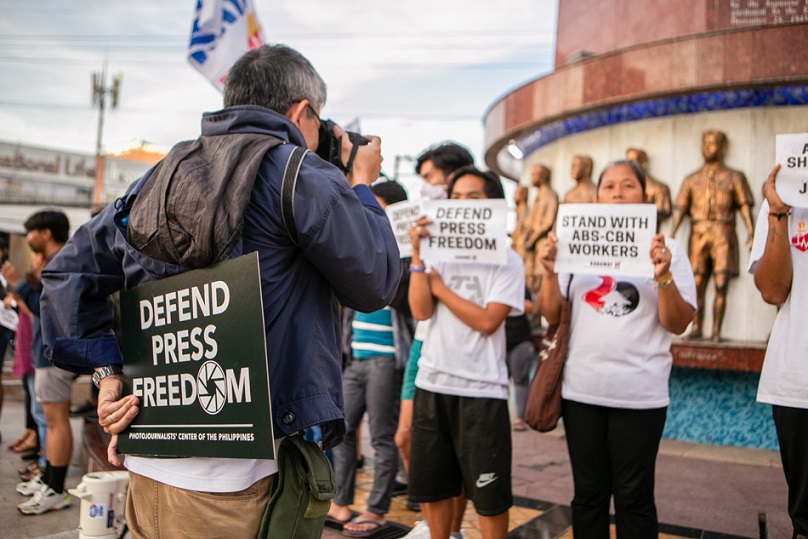
The Reuters Digital News Report 2021 Asia-Pacific launch
Across the globe, television has regained its audience for news during the coronavirus disease 2019 (COVID-19) pandemic, but not in the Philippines, due in part to the closure of ABS-CBN in May 2020.
This was one of the key findings discussed during the Asia-Pacific launch on Monday, July 5, of the 10th edition of Digital News Report (DNR 2021) by the Reuters Institute for the Study of Journalism.
Presenting the report’s executive summary, lead author Nic Newman, senior research associate at Reuters ISJ, noted a resurging consumption of TV and TV news programs as people were confined in their homes due to COVID-19 mobility restrictions.
University of the Philippines professor Yvonne Chua, author of the Digital News Report’s Philippine page, said Filipinos were deprived of the ability to consume TV news after ABS-CBN was forced to go off the air following the expiration of its legislative franchise.
The study’s findings jibe with an earlier data cited by Ruperto Nicdao, president of the Kapisanan ng mga Brodkaster ng Pilipinas. In a media forum marking the World Press Freedom Day last May, Nicdao said research by Nielsen and Kantar Media Philippines showed that television viewership peaked around 23% to 24% when the pandemic began early last year, but plummeted to pre-COVID-19 level of 13.8% to 10% when ABS-CBN was forced out of the air.
“Millions of Filipinos just tuned out of TV … that’s a big drop in overall TV viewing,” Nicdao said. “Because of the closure of ABS-CBN, most Filipinos are not getting the information that ABS-CBN should have been providing.”
This year’s Digital News Report is based on an online poll of 92,000 people in 46 media markets, representing the views of more than half the world’s population.
A total of 2,209 Filipino internet users aged 18 and above participated in the survey conducted in late January to early February by the international market research agency YouGov Plc.
Chua, a former newspaper and digital news editor, noted that the Philippines indeed “lost a very significant audience, and we’re not talking about any audience. We’re talking of news consumption.”
Without its free-to-air network, ABS-CBN’s reach lost 21 points, bringing its reach down to 41%, Chua cited. Although GMA News’s reach increased by six points since the forced closure of its rival network, Chua pointed out that the gain was “nowhere near” the audience that ABS-CBN lost.
While ABS-CBN did move to its digital platforms such as YouTube after its forced closure, Chua said that the network’s reach is just not the same as its free-to-air programming, since the Philippines has an internet penetration of only 78%.
Chua added that the closure of ABS-CBN has deprived Filipinos of information during the time of a pandemic. She explained that, apart from its Metro Manila stations, ABS-CBN had stations in 12 of the country’s 17 regions.
“If you look at Southeast Asia, television viewership in the Philippines has always been high, and for you to close a network at that time is certainly depriving people of public interest reporting,” she said.
Increasing concern over press freedom
According to Newman, more people raised concerns on press freedom in the Asia-Pacific region. He cited the closure of ABS-CBN and Hong Kong media outlet Apple Daily as examples.
Newman also noted that journalists in the region continue to face political attacks, as well as coordinated online harassment. In the Philippines’ Digital Media Report page, Chua mentioned the red-tagging of local journalists.
Similar to its Southeast Asian neighbors, the Philippines is experiencing a decline in press freedom, according to Chua. She added that attacks on the free press cause “a chilling effect,” which incites fear among other journalists.
Chua said that the rest of the world can learn from the attacks on press freedom in Southeast Asia, as the state of a country’s free press can impact the news. “News consumption will definitely change once we lose our media freedom,” she reminded.
Tatiana Maligro is a student of the
Ateneo de Manila University writing for VERA Files as part of her internship.
This article was carried also by ABS-CBN online.





